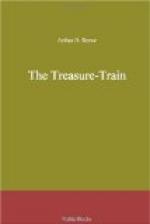There was an air of impatience in her tone, of restless dissatisfaction. I felt also that there was an element of danger, too, in a woman just passing from youth making a confidant of another man.
It was a mixed situation with the quartet whom we were watching. One thing was sufficiently evident. They were all desperately engaged in the pursuit of wealth. That was a common bond. Nor had I seen anything to indicate that they were over-scrupulous in that pursuit. Within half an hour I had seen Leontine with Sydney and Nanette with Whitson. Both Sydney as consular agent and Whitson through his influence with the shipping trust possessed great influence. Had the party thought it out and were they now playing the game with the main chance in view?
I looked inquiringly at Kennedy as the voices died away while the couple walked slowly down the deck. He said nothing, but he was evidently pondering deeply on some problem, perhaps that which the trend of affairs had raised in my own mind.
Our delay had not been long, but it had been sufficient to cause us to miss finding Leontine and Sydney. We did, however, run across Burke, bent evidently on watching, also.
“I don’t like this business,” he confessed, as we paused to compare experiences. “I’ve been thinking of that Mexican business you hinted at, Kennedy. You know the islands would be an ideal out-of-the-way spot from which to start gun-running expeditions to Mexico. I don’t like this Leontine and Burleigh. They want to make money too bad.”
Kennedy smiled. “Burleigh doesn’t seem to approve of everything, though,” he remarked.
“Perhaps not. That’s one reason why I think it may be more dangerous for Sydney than he realizes. I know she’s a fascinating girl. All the more reason to watch out for her. But I can’t talk to Sydney,” he sighed.
It was an enigma and I had not solved it, though I felt much as Burke did. Kennedy seemed to have determined to allow events to take their course, perhaps in the hope that developments would be quicker that way than by interfering with something which we did not understand.
In the smoking-room, after we left Burke, Kennedy and I came upon Erickson and Burleigh. They had just finished a game of poker with some of the other passengers, in which Burleigh’s usual run of luck and skill had been with him.
“Lucky at cards, unlucky in love,” remarked Burleigh as we approached.
He said it with an air of banter, yet I could not help feeling that there was a note of seriousness at the bottom of it. Had he known that Leontine had been with Sydney on the deck? His very success at poker had its effect on me. I found myself eying him as if he had been one of the transatlantic card sharps, perhaps an international crook. Yet when I considered I was forced to admit that I had nothing on which to base such a judgment.




